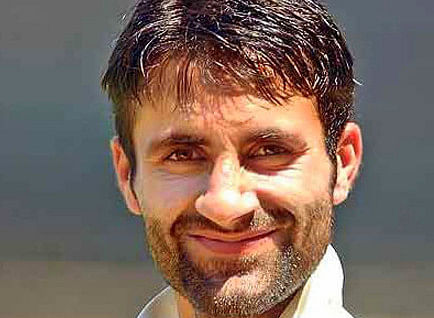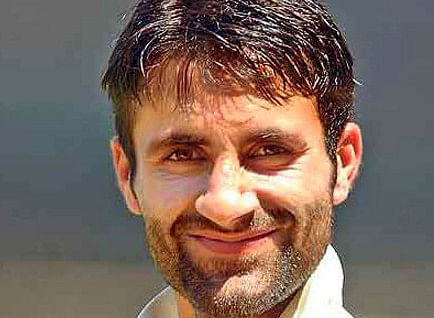
A tale extraordinaire - Parvez Rasool

“If you can imagine it, you can achieve it.
If you can dream it, you can become it.
All our dreams can come true.
If you we have the courage to pursue them.”
– Walt Disney
Nothing is impossible. After all, how hard it could be to dream & play cricket in a country that breathes more cricket & less oxygen? It could be. When you come from the country’s one of the most, if not the most politically disturbed place. And geographically, not at all suitable for cricket. Laid in the serene beauty of the snow clad Himalayas under the mountaneous Karakoram valley & to the west of the Tibetan Plateau, almost 1,073 feet above the sea level in the northern most part of the Indian subcontinent, resides the once peaceful state of Jammu and Kashmir. The place of breathtaking landscapes and breathtaking views, not left behind from the rest of country’s cricketing megalomania, is all set to watch one of its sons take the field in blue in Zimbabwe in a few weeks.
Not even close to the best of facilities, yet, here we are discussing the first ever native Kashmiri to don the blues. He goes by the name of Parvez Ghulam Rasool Zargar. Hailing from the beautiful “Town Of Chinars”, Bijbehara, a small town on the banks of the river Jhelum, the Parvez Rasool saga is worth it all. Like eight out of the ten cricket aspirants, his cricketing influence reflected upon from his father himself, at a very early age. “Parents wanted their children to study,” says his father Ghulam Rasool Zargar, “to become doctors or engineers. But I always wanted my children to follow cricket.”
Ghulam himself was a roller operator in the government’s mechanical engineering department, but his passions seemed to be more engaged in the cricket he played at district level. The growing civil unrest in the Valley put paid to any cricketing aspirations he might have had, but he was determined that things will be different for his boys, Parvez, Asif and Umar.
“You have to be lucky to be born into suh a family,” Parvez says, “for whom cricket is more than an amusement, a game for kids who can’t excel at Science or Mathematics.” The 24 year old Rasool took up cricket rather seriously playing first for his school, then J&K U-14 & U-16 teams, followed by some club cricket representing the Bijbehara Sports Club, a prominent & renowned base for the cricketers hailing from Central & South valleys of Kashmir. There he chanced upon the expert eyes of once Jammu’s poster boy of cricket, Abdul Qayoom. “When I first saw him in the nets, he would bat well and keep wickets. Then one day, he insisted on bowling to the tail-enders. He finished them off one by one and then I knew he was a talent, a real all-rounder.”
2008 :
Soon his cricketing prowess earned him a shift to the capital, Srinagar, where he came under the selection radar to play for the U-19 & U-22 sides. In an U-22 CK Naidu Trophy match of 4 days against Himachal Pradesh, Rasool took 5-78 and hit the winning runs scoring a brisk 21* as Jammu and Kashmir thumped HP by 6 wickets. An upset nevertheless and the main reason behind the upset, Rasool, found himself getting a quick call-up to the senior Ranji side in no time.
Cometh November 16, a bright eyed 18 year old made his debut against the Ranji side of neighbours, Himachal Pradesh. But it didn’t fold the fairytale way. Inexperience was taken for a toll as Rasool gave away 58 and 85 runs in both the innings at a less than impressive economy rate of 5.27 and 5.31 respectively, without picking up a single wicket. His handy contribution of 40 in the first innings came to no use as the mighty Himachal Pradesh thumped Kashmir by 480 big runs.
Dreams suffered a landslide first up, indeed.
Parvez, like many others in the team never had any giant leaps or whatever you would call them. His growth was a gradual one. More like one stair at a time rather than rocketing to the top of the staircase at once. He had a promising first year(2004/05) in the Vijay Merchant trophy. He would never know the at that time, the guy smashing 179 against his team will be his first national captain one day. His dual role helped his cause and was retained for the next edition. Results aside, that season turned out to be a successful one for this man. 202 runs and 16 wickets.
The ‘gradual’ was evident yet again. He found his name in the limited overs team for the next year and retained his position in the longer format. Though the transformation from the U-17 to U-19 didn’t work that well, he picked up his U-19 form in his second year (2007-08) by picking up 8 wickets against Jharkand. He picked up his batting by hitting a fluent 78 against Goa as the tournament went on. He took his team to the Cooch Behar trophy semifinals, securing fourth place. A general observation here is he always peaked with time.